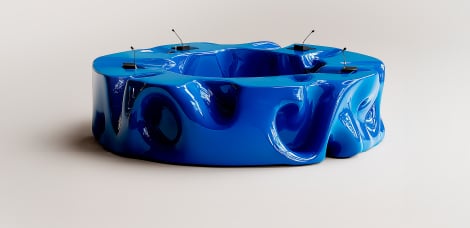Twitter es trending topic estos días. La propia red es uno de los temas más comentados dentro de sí misma, y no es para menos ante el punto de inflexión que parece avecinarse sobre ella. La semana pasada se confirmaba la compra de Twitter por parte de Elon Musk y, si estamos ante la red de la discusión, el debate y la polarización por excelencia, el desembarco en la propiedad por parte del hombre más rico del mundo aseguraba la controversia.
Artículo publicado en el medio español La Información.Twitter is a trending topic at the moment. The social media platform itself is one of the most talked about issues on its own platform, not for nothing given the turning point that it seems to be facing.
The purchase of the company by Elon Musk was confirmed last week and, if this is the platform for discussion, debate and polarization par excellence, the unfolding of its ownership by the richest man in the world guarantees controversy.
It should come as no surprise at this stage that a magnate should invest in the media or platforms. From William Randolph Hearst to Jeff Bezos, via Rupert Murdoch, history abounds with examples. What perhaps raises most eyebrows on this occasion is this aura of “savior”, beyond that of an investor, that the South African businessman has presented himself with. The staging has been such that in this case it is simpler to find an equivalent in fiction, in the millionaire Bruce Wayne who came to the rescue of the decadent Gotham City. And let’s remember that Batman has always been synonymous with controversy.
Leaving to one side the overreactions, both from those who say they will abandon the platform following the arrival of the magnate (will they be the same as those who were going to leave WhatsApp with the arrival of Zuckerberg?) and from those lackeys that pressed to deify him before doing anything, the most important aspect of the whole Twitter affair we are seeing is undoubtedly the reflection opening up on its nature and its future.
It is undeniable that the platform has needed, let’s say this plainly, “a change”. But a genuine one. Twitter is one of the most influential platforms with the greatest potential (the politician and journalist’s favorite, without looking further), and yet it has always been one of those that has raised the most doubts at a business level. You just need to look at its latest results or compare its ups and downs on the stock market with the big tech companies.
If we had to place Twitter due to its functionality, I am sure that many of us would define it as the “platform of conversation”, in light of its format and immediacy.
HOWEVER, I THINK WE WOULD AGREE THAT IT IS ONE OF THE SOCIAL MEDIA PLATFORMS WHERE WE CAN UNFORTUNATELY FIND A LACK OF MANNERS, EMPATHY AND TRUST – THREE KEY CONDITIONS FOR THE EXCHANGE OF IDEAS.
Over the last year, the microblogging platform has been extremely active in launching new functionalities, such as Super Follows, Space, Communities, the failed Fleets and tests with a pay version – Twitter Blue – without any of them leading to a significant change of course. For various reasons, it has not managed to achieved a, let’s say, “friendly” environment for dialogue between users (precisely a function that should be its strong point compared with other social media platforms) and that is where we find the root of all its evils. Twitter has concerned itself more with offering new things to do on its platform than with ensuring that what it was always designed for and where it has its differential value – conversation – could be carried out optimally.
There are too many accounts, from bots to anonymous profiles, that are professionalized as sectarian stooges of all sorts. However, Twitter has always been lukewarm and ineffective in dealing with this problem, probably thinking that the number of users was its main asset while leaving their quality somewhat overshadowed. Measures continue to be implemented through the application of reporting systems that are often used by trolls and have caused, on more than one occasion, the arbitrary closure of accounts of real people while thousands of unidentified accounts with spurious interests continue to operate freely.
It is possible that the best way to ensure more users in the future is to have fewer at present, and this is one of the lines of action that Elon Musk has most stressed, getting rid of the bots and verifying all human accounts (“or die trying”, he tweeted). We still have little certainty as to what to expect in this new era, aside from this declaration of intent, along with the creation of algorithms with open code or the more abstract, ambitious and somewhat pretentious idea that has filled the headlines: “Defend freedom of expression”. What is true is that these plans sound good on paper (or in a tweet, in this case), but as is often said, the devil is in the detail, so we need to wait and see how these ideas pan out.
It is complicated to digest how a multimillionaire businessman can be presented as a savior, and clearly skepticism as to his good intentions is quite understandable. Bruce Wayne knew this, which is why he hid behind Batman’s mask. Elon Musk is unmasked and will have to shrug off this burden to push his plans through.
In the Dark Knight – the best film of the prolific Batman series – there is a memorable quote that says something like “he is the hero that Gotham deserves, but not the one it needs now”. In this case, Musk is probably not the hero that Twitter deserves, but perhaps the one it most needs at this time in which a change of course is clamored for.
We will see if he ends up being acknowledged as such or if he ends up being the villain. We will remain glued to the plot of this film. Perhaps the little birdy will end up turning into a bat.
O Twitter é um trending topic ultimamente. A própria rede é um dos tema mais falados dentro de si própria, sobretudo, tendo em conta o ponto de inflexão que parece estar a surgir sobre ela.



